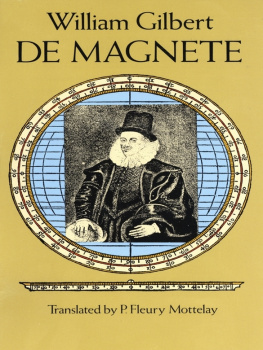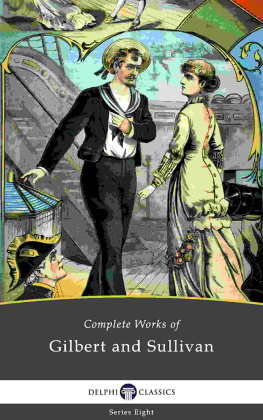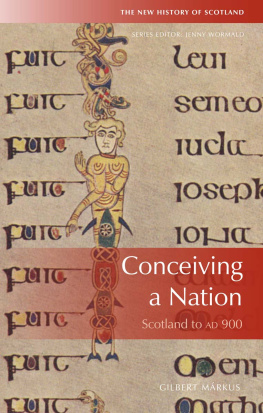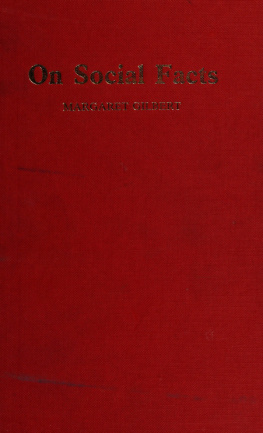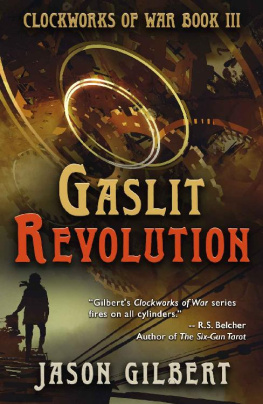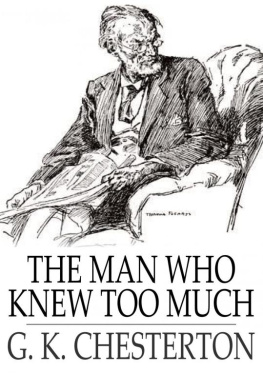Gilbert - De Magnete
Here you can read online Gilbert - De Magnete full text of the book (entire story) in english for free. Download pdf and epub, get meaning, cover and reviews about this ebook. year: 2012, publisher: Dover Publications, genre: Romance novel. Description of the work, (preface) as well as reviews are available. Best literature library LitArk.com created for fans of good reading and offers a wide selection of genres:
Romance novel
Science fiction
Adventure
Detective
Science
History
Home and family
Prose
Art
Politics
Computer
Non-fiction
Religion
Business
Children
Humor
Choose a favorite category and find really read worthwhile books. Enjoy immersion in the world of imagination, feel the emotions of the characters or learn something new for yourself, make an fascinating discovery.
- Book:De Magnete
- Author:
- Publisher:Dover Publications
- Genre:
- Year:2012
- Rating:4 / 5
- Favourites:Add to favourites
- Your mark:
- 80
- 1
- 2
- 3
- 4
- 5
De Magnete: summary, description and annotation
We offer to read an annotation, description, summary or preface (depends on what the author of the book "De Magnete" wrote himself). If you haven't found the necessary information about the book — write in the comments, we will try to find it.
De Magnete — read online for free the complete book (whole text) full work
Below is the text of the book, divided by pages. System saving the place of the last page read, allows you to conveniently read the book "De Magnete" online for free, without having to search again every time where you left off. Put a bookmark, and you can go to the page where you finished reading at any time.
Font size:
Interval:
Bookmark:
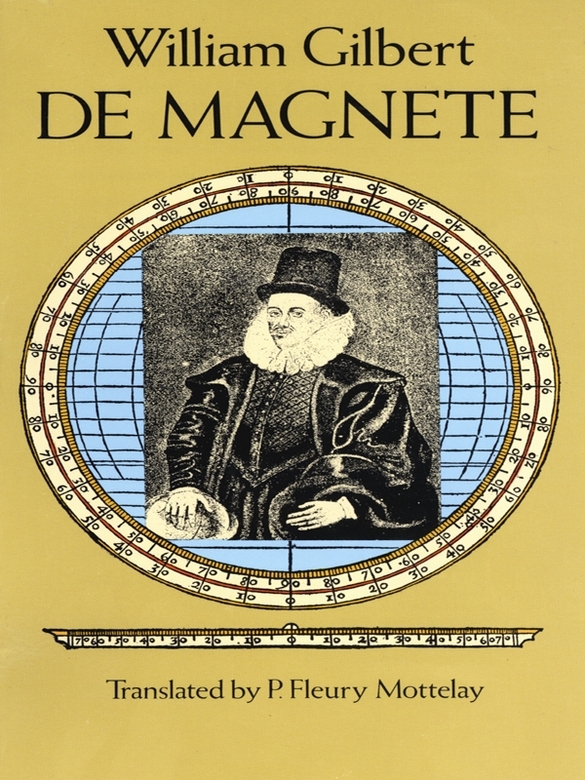
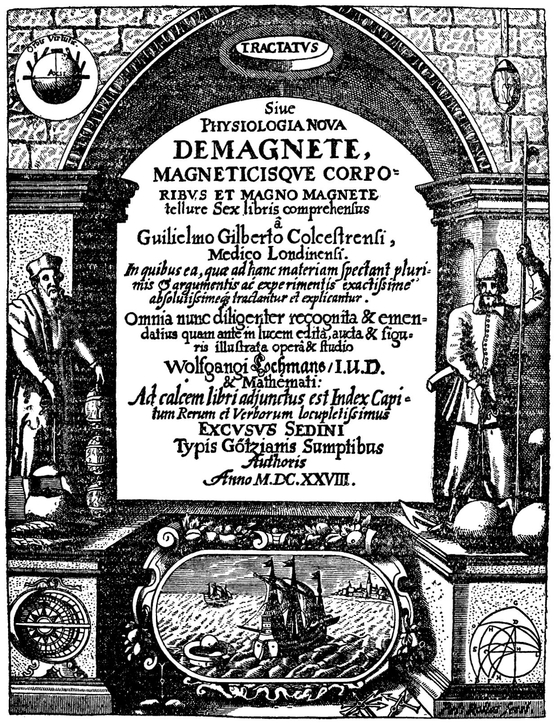
FAC-SIMILE TITLE PAGE OF GILBERTS DE MAGNETE, SBCOND EDITION, 1628.
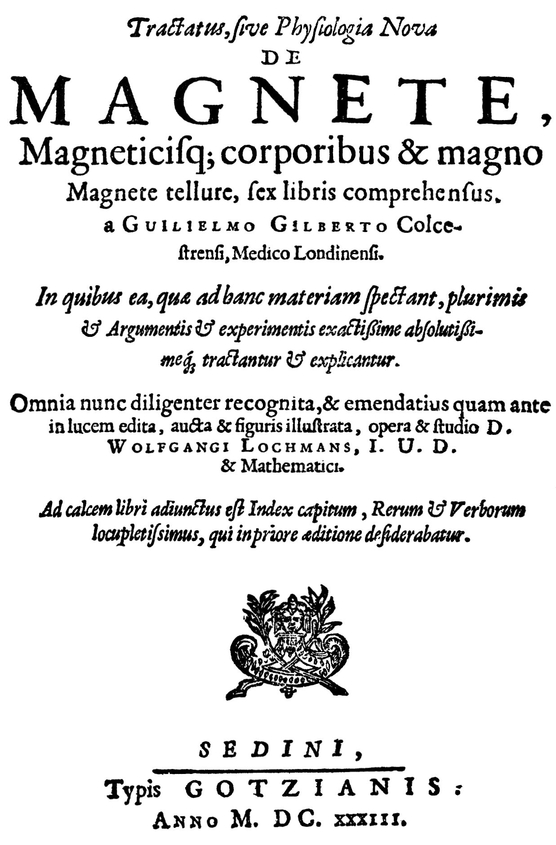
FAC-SIMILE TITLE PAGE OF GILBERTS DE MAGNETE, THIRD EDITION.
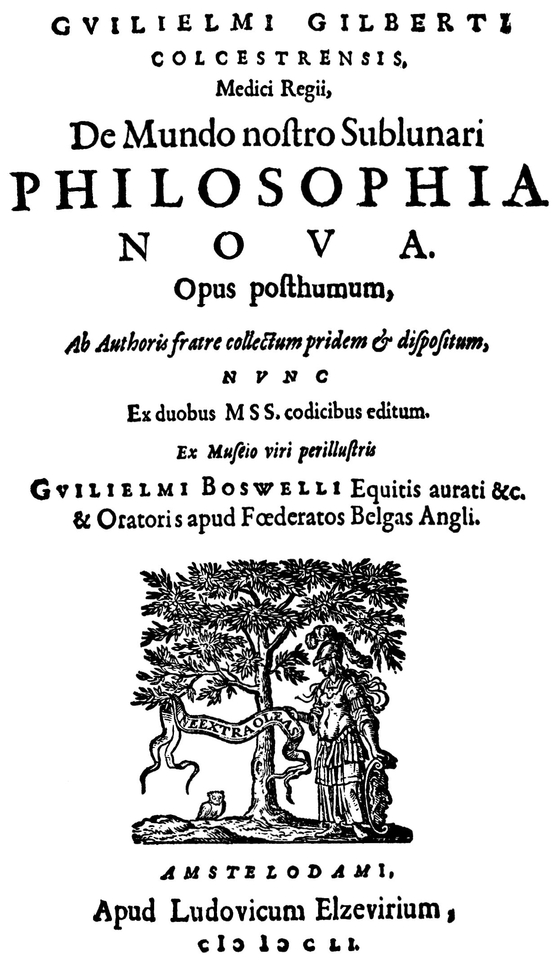
FAC-SIMILE TITLE PAGE OF GILBERTS DE MUNDO NOSTRO SUBLUNARI PHILOSOPHIA NOVA.
I N former times when philosophy, still rude and uncultured, was involved in the murkiness of errors and ignorances, a few of the virtues and properties of things were, it is true, known and understood : in the world of plants and herbs all was confusion, mining was undeveloped, and mineralogy neglected. But when, by the genius and labors of many workers, certain things needful for mans use and welfare were brought to light and made known to others (reason and experience meanwhile adding a larger hope), then did mankind begin to search the forests, the plains, the mountains and precipices, the seas and the depths of the waters, and the inmost bowels of earth, and to investigate all things. And by good luck at last the loadstone was found, as seems probable, by iron-smelters or by miners in veins of iron ore. On being treated by the metallurgists, it quickly exhibited that strong powerful attraction of ironno latent nor obscure property, but one easily seen of all; one observed and commended with many praises. And after it had come forth as it were out of darkness and out of deep dungeons and been honored of men on account of its strong and marvellous attraction of iron, then many ancient philosophers and physicians discoursed of it, and briefly (but briefly only) made it matter of record: as, for instance, Plato in the Io, Aristotle only in his first book De Anima; likewise Theophrastus the Lesbian, Dioscorides, Caius Plinius secundus, Julius Solinus. These record only that the loadstone attracts iron : its other properties were all hid. But lest the story of the loadstone should be jejune and too brief, to this one sole property then known were appended certain figments and falsehoods which in the early time no less than nowadays were by precocious sciolists and copyists dealt out to mankind to be swallowed. For example, they asserted that a loadstone rubbed with garlic does not attract iron ; nor when it is in presence of a diamond. still I do not want to strip the Melfitani of so great an honor, seeing that by them compasses were first commonly made in Mediterranean lands. Goropius ascribes the invention to the Cimbri or Teutons, on the ground that the thirty-two names of the winds inscribed on the compass are pronounced in German by all mariners, whether they be British or Spaniards, or Frenchmen. But the Italians give them names in their own vernacular. Some think that Solomon, King of Judea, was acquaint with the compass and taught the use of it to his pilots for their long voyages when they brought from the Western Indies such a quantity of gold : hence Arias Montanus holds that the regions in Peru that abound in gold got their name from the Hebrew word Paruaim. But it is more probable that the gold came from the coast of lower Ethiopia, or, as others declare, from the region called Cephala. The story seems less true for the reason that the Phnicians, next neighbors of Judea, most skilful navigators in early times (whose talents, labor, and counsels Solomon employed in building ships and in his expeditions as well as in other ways), were ignorant of magnetic aids, of the use of the mariners compass: for were it used by them, doubtless the Greeks, the Italians, and all the Barbarians would have known of a thing so necessary and so celebrated through common use ; nor would things famous, most easily known, and of the highest necessity, ever perish in oblivion ; on the contrary, the knowledge would have been handed on to posterity, or some memorial in writing would survive.
Sebastian Cabot first discovered that the magnetized iron (needle) varied. discusses a few problems regarding the loadstone, adopting the current opinions of others; he believes that the variation is caused by a certain magnetic island mentioned by Olaus Magnus. Josephus Costa, knowing nothing whatever of the subject, nevertheless pours out empty words about the loadstone. Livio Sanuto in his Geography (written in Italian) discourses at length of the prime magnetic meridian, of the magnetic poles, whether they are terrestrial or celestial ; treats also of an instrument for finding the longitude ; but as he does not understand the nature of the loadstone, he does but add errors and obscurities to his otherwise excellent treatise. Fortunius Affaitatus has some rather silly philosophizing about attraction of iron and the turning toward the poles. Very recently Baptista Porta, a philosopher of no ordinary note, makes the 7th book of his Magia Naturalis a very storehouse and repertory of magnetic wonders ; but he knows little about the movements of the loadstone, and never has seen much of them; much of what he has learned about its obvious properties, either from Messer Paolo, the Venetian, or through his own studies, is not very accurately noted and observed ; the book is full of most erroneous experiments, as will appear in fitting place; still I hold him worthy of praise for that he essayed so great a task (even as he has essayed many another task, and successfully too, and with no inconsiderable results), and that he has given occasion for further researches.
All these philosophers, our predecessors, discoursing of attraction on the basis of a few vague and indecisive experiments and of reasonings from the recondite causes of things; and reckoning among the causes of the direction of the magnet, a region of the sky, celestial poles, stars, asterisms; or mountains, cliffs, vacant space, atoms, attractional or collimational regions beyond the heavens, and other like unproved paradoxes, are world-wide astray from the truth and are blindly wandering. But we do not propose just now to overturn with arguments either these their errors and impotent reasonings, or the other many fables about the loadstone, or the fairy-tales of mountebanks and story-tellers; as, for example, the questions raised by Franciscus Rueus about the loadstone, whether it is an imposture of cacodmons; or the assertion that a loadstone placed unawares under the head of a sleeping woman drives her out of the bed if she be an adulteress; or that by its fume and vapor the loadstone is of use to thieves, as though the stone were by nature given to promote thefts; or that it withdraws bolts and opens locks, as Serapio insanely imagines; or that iron held by a loadstones attraction, being placed in a balance, adds nought to the weight of the loadstone, as though the weight of the iron were absorbed by the virtue of the loadstone ; or that, as Serapio and the Moors report, there are in Indian seas certain sharp-pointed rocks abounding in loadstone, the which draw every nail out of ships that land alongside them and hold the vessels: this story, Olaus Magnus does not fail to recite: he tells of mountains in the North possessing such power of attraction, that ships have to be constructed with wooden pegs, so that as they sail by the magnetic cliffs there be no iron nails to draw out. Arnoldus de Villanova fancies that the loadstone frees women from witchcraft and puts demons to flight ; Marbodaeus, a Frenchman, fugleman of vain imaginings, says that it can make husbands agreeable to wives and may restore wives to their husbands ; Caelius Calcagninius in his Relationes says that a magnet pickled with salt of the sucking-fish has the power of picking up a piece of gold from the bottom of the deepest well. In such-like follies and fables do philosophers of the vulgar sort take delight; with such-like do they cram readers a-hungered for things abstruse, and every ignorant gaper for nonsense. But when the nature of the loadstone shall have been in the discourse following disclosed, and shall have been by our labors and experiments tested, then will the hidden and recondite but real causes of this great effect be brought forward, proven, shown, demonstrated; then, too, will all darkness vanish ; every smallest root of error, being plucked up, will be cast away and will be neglected; and the foundations of a grand magnetic science being laid will appear anew, so that high intellects may no more be deluded by vain opinions.
Font size:
Interval:
Bookmark:
Similar books «De Magnete»
Look at similar books to De Magnete. We have selected literature similar in name and meaning in the hope of providing readers with more options to find new, interesting, not yet read works.
Discussion, reviews of the book De Magnete and just readers' own opinions. Leave your comments, write what you think about the work, its meaning or the main characters. Specify what exactly you liked and what you didn't like, and why you think so.

